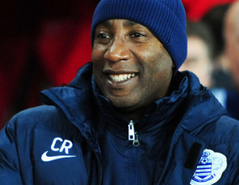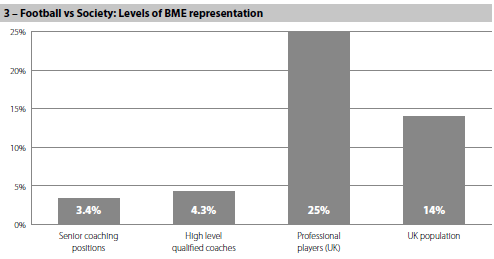
Convention dictates that a person should only support one team in a competition. Therefore, when QPR challenged Liverpool for the title in the 1970s I was forced to opt for one or the other. Liverpool were the team I loved to watch on TV. However, I sided with the underdog on the grounds that I would like them to win one title. Liverpool remained the team I preferred to watch.
It is a bit like that with Ramsey. He did not have a very high profile prior to his appointment. He also has some characteristics not regularly seen among managers in the Premier League. He is black and bald (Ferguson, Wenger, and Mourino all have plenty of hair.) A 2014 report by Stephen Bradbury shows that black, minority, and ethnic (BME) coaches are underrepresented in English football (here). The picture below is taken from that report. It shows that BME make up 14% of the English population. BME are overrepresented in the players grouping and underrepresented in coaching positions.
There are plenty of other difficulties with the statistical approach to proving discrimination. Simon Kuper and Stefan Szymanski write about some of them in Soccernomics. Kuper & Szymanski argue that discrimination has become less of an issue when it comes to players, but that it remains an issue in the hiring of coaches. The authors of Soccernomics take the reader through some of Szymanski's research on the issue. They point out that when the data for 1978-1997 was examined, a massive 92% of the variation in league position could be explained by wages. That leaves only 8% of the variation for discrimination to raise its ugly head. Yet, it was an alternative approach that was used to determine if discrimination was taking place. Szymanski showed that teams with a greater proportion of black players outperformed their rivals - "If two teams had identical annual wage budgets, the team with more black players would finish higher in the league". I'm sure that those who would argue that there is not discrimination might query some aspect of his statistical approach, e.g. he forgot to include some important control variable.
Another problem with a statistical approach to discrimination is the problem with measuring a player's productivity. Given the overarching theme of the Soccernomics, it is very surprising to read the following sentence "Anyone who knew soccer could judge fairly easily how good a player was just by watching him play". The disagreement about almost every player's ability surely raises issues about this sentence. When it comes to managers we tend to have less data and this makes the measurement problem even bigger.
At the end of the season, we will have data on Ramsey's wins, draws and losses. Let us hope that even with this limited data, we can say his time was a success. In the meantime I would encourage people to read the chapter in Soccernomics. The book, and the relevant chapter on discrimination, does what its title suggests. By contrast, and in the words of Homer Simpson, To Kill a Mockingbird does not teach him how to kill a mocking bird but it did teach him not to judge a man by the colour of his skin.

 RSS Feed
RSS Feed